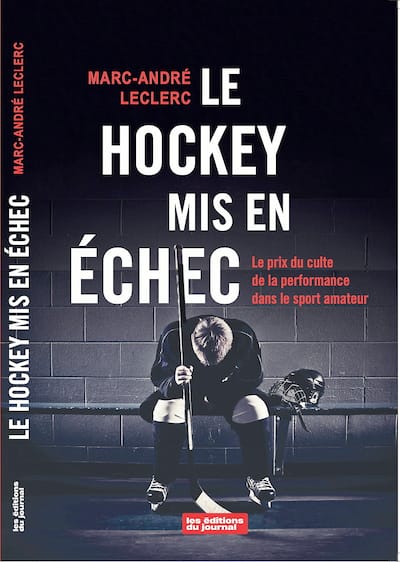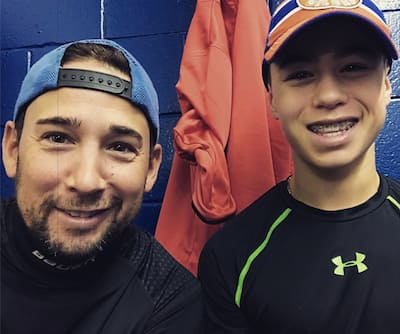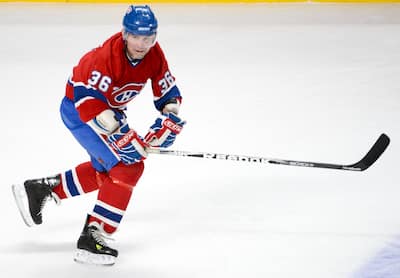Jean-François Baril has no regrets that his son left the family home at 16 to play hundreds of kilometers away with the Baie-Comeau Drakkar.
• Also read: Book | “Hockey defeated”: 20 speakers from the world of sports explain why our hockey is sick
• Also read: 10 specific cases that show our hockey is sick: agents who promise cars, racist comments and negative parents who take up all the space
But as he mentions in the book Hockey defeated Marc-André Leclerc, host and comedian is “convinced that apart from five or six exceptional players, he is too young to play in the QMJHL”.

Photo courtesy of Les éditions du Journal
“A lot of times, once you’re in the first round, they keep you in the team because there’s always the scare of playing in the United States,” Mr. Baril explains in an interview with News. In some cases, when they feel like they’re not going to make the team, kids say, ‘Well, I’m not going to camp.'”
“Several observers, parents, agents or former players believe that 16 is too young to enter the QMJHL,” the author also writes in his new work.
“Hooded” but stressful
This is one of the aspects of high-level hockey that Marc-André Leclerc addresses on his website and for which he gave his word to Jean-François Baril as a hockey dad.
A hockey enthusiast, Mr Baril felt “great pride” when Nathan, now a member of the Val-d’Or Foreurs, was drafted in the first round by Drakkar.

Jean-François Baril and his son Nathan when the latter was 13 years old.
Courtesy photo
“His first match, his first goal, it was destroyed,” says Jean-François Baril. Parents of 16-year-olds don’t experience that!”
“But there’s also a lot of stress that you manage remotely,” he continues. All sorts of things happen in the lives of 16-year-olds. These are trivial examples, but when Nathan left, he hadn’t completed his driving course. He also experienced heartbreak.”
However, not only parents experience challenges and stress. Young people too, points out Mr. Baril.
“He has to be able to live with it mentally because you’re away from your mother. You have to be able to physically hold your own on the ice,” he says.
No problem, says the commissioner
New Maritimes Quebec Junior Hockey League (QMJHL) commissioner Mario Cecchini doesn’t believe that’s a problem.
Marc-André Leclerc mentions in the book that Mr. Cecchini “looks favorably upon these young people who are maturing and developing rapidly.”
They also learn “discipline, teamwork, respect for authority, managing atypical schedules and travel,” we read.
Jean-François Baril disagrees with this point. Now 19, “Nathan is more mature than most young people his age,” he says.
“When a coach calls you into his office, he’s talking to an adult. Then, going to bring your resume to work won’t bother you too much,” he says above all.
You need the right conditions
But for the experience to be positive, the youngster needs to be part of a team that will give him ice time to develop, he says.
“If instead of saying ‘we’ll take it anyway because we don’t want to lose them’, we always take whoever deserves the spot, the caliber of the QMJHL would be stronger,” he analysed. And the caliber of a AAA dwarf would also be stronger.”
“I think the stronger the leagues are, the more youngsters are in the right box and with the right playing time, and that’s how they end up developing.
“Why does a 16-year-old have to fight?” asks the former brawler
What struck Marc-André Leclerc the most during the twenty or so interviews he conducted for his book Hockey defeatedthus, at the beginning of the career, players have their own “cast”, which they can almost never get rid of.
In the interview, the author mentions former Canadian tough guy Dave Morissette as an example. The man, now a TVA Sports analyst, asks in the book’s pages, “why does a 16-year-old have to fight.”
“A player like Dave Morissette (during his junior career) was uprooted but didn’t want to go back to the factory,” explains Mr Leclerc. This is what he fought for. He knew this was how he would make his place.”

Dave Morissette
Archive photo, Martin Chevalier
“The whole system needs to be reviewed”
Marc-André Leclerc notes that in hockey, players are given an “extremely young figure”.
“Then you’re stuck with it for the rest of your life,” he says. However, Dave told me that instead of fighting, he would like to have time to practice his feints. To try to be a better player, to be able to break through.
Morissette, who played 11 games in the NHL, told the author that he has no regrets about his career. “I owe everything to hockey,” he says in the book.
However, he believes that “hockey is sick in Quebec.” “I think the whole system needs to be reviewed,” adds the former striker.
“What surprised me,” said Marc-André Leclerc, “is that all the cues are in hockey. The casting we give you, you’re with him.”
He was looking at the schedule
The case of brawlers like Dave Morissette is particularly notable.
The rules implemented by the QMJHL last year certainly helped weed out the type of player whose only job was to drop the gloves. From the 2023-2024 season, if a fight occurs, both players will be automatically ejected. The instigator will be suspended for one match.
But for several hockey players who were destined to fight from the junior ranks, including those who, like Morissette, played in the 1990s, the memory of those games is still very vivid.
“Dave was looking at the schedule and he knew. He knew this game was going to be a big night (because he was a tough guy on the other team). It left an impression on me,” points out Mr. Leclerc.

